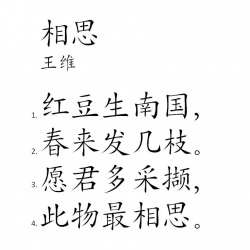dailycharacter
相思(王维)
Title: Lovesick ▪ 相思
Author: Wang Wei ▪ 王维
Poetic Form: júejù ▪ 绝句
1. (红 + 豆) + 生 + (南 + 国)
(red + bean) + to be born + (southern + country)
gloss: Red beans grow in the southern lands
NB: "red beans" are a reference to the
seeds of the red beantree
2. 秋 + 来 + (发 + (几 + 枝))
Autumn + to come + (to dispatch + (several +
twigs))
gloss: Autumn arrives, shedding branches.
3. 愿 + 君 + 多 + 采 + 撷
to wish + you + many + (to gather + to pick)
gloss: May you pick many (of them)
4. (此 + 物) + (最 + (相 + 思))
(this + thing) + (most + (to examine + to long for))
gloss: This is what makes you the most lovesick
Author: Wang Wei ▪ 王维
Poetic Form: júejù ▪ 绝句
1. (红 + 豆) + 生 + (南 + 国)
(red + bean) + to be born + (southern + country)
gloss: Red beans grow in the southern lands
NB: "red beans" are a reference to the
seeds of the red beantree
2. 秋 + 来 + (发 + (几 + 枝))
Autumn + to come + (to dispatch + (several +
twigs))
gloss: Autumn arrives, shedding branches.
3. 愿 + 君 + 多 + 采 + 撷
to wish + you + many + (to gather + to pick)
gloss: May you pick many (of them)
4. (此 + 物) + (最 + (相 + 思))
(this + thing) + (most + (to examine + to long for))
gloss: This is what makes you the most lovesick
Translation
Lovesick
translation by Jessica Alexander ©
The red beantree sprouts up in southern lands;
How many new sprigs in the Spring?
Go ahead, friend, gather many:
These are the best cure for the lovesick.
translation by Jessica Alexander ©
The red beantree sprouts up in southern lands;
How many new sprigs in the Spring?
Go ahead, friend, gather many:
These are the best cure for the lovesick.
Analysis
In China, it is said that, once upon a time, a woman whose husband died cried tears that grew into a vine, which bore red beans. For this reason, red beans are also called “beads of lovesickness”. “Lovesickness,” in Chinese terms, is any strong longing for a person, lover or otherwise. In this poem, Wang Wei uses simple terms to convey very strong emotions of fraternal affection toward a friend. He sets the stage with his evocation of red beans in line 1, a well-known symbol of lovesickness; he also reminds the reader that they grow in the south, far from the north where Wang Wei lives. Like line 1, line 2 is very neutral, questioning how many branches the red bean vines will put forth in Spring. Placed back to back, however, these two lines belie a deeply intimate question: how strong will your “lovesickness” be for me when Spring arrives? Or how strong will mine be?
Line 3 moves into direct address, with Wang Wei exhorting his friend to gather many, subtly indicating that his friend lives in the south and, therefore, far away. In ancient China, picking flowers or plants was a way of being close to someone as it often led to sentimental thinking. Wang Wei is, in effect, saying “pick red beans, a symbol of longing, and think of me.” The idea that his friend would think of him when gathering red beans hints that this is a very close friend, as does the use of 多, ‘many’.
In line 4, “lovesick” echoes the “red beans” of line 1, linking the beginning of the poem to its end. The poet tells his friend that red beans are the best thing to remember him by. Interestingly, Wang Wei uses the concept of lovesickness here to join two individuals; they are divided only by distance, not by emotion.
No rhyme.
Reference
Line 3 moves into direct address, with Wang Wei exhorting his friend to gather many, subtly indicating that his friend lives in the south and, therefore, far away. In ancient China, picking flowers or plants was a way of being close to someone as it often led to sentimental thinking. Wang Wei is, in effect, saying “pick red beans, a symbol of longing, and think of me.” The idea that his friend would think of him when gathering red beans hints that this is a very close friend, as does the use of 多, ‘many’.
In line 4, “lovesick” echoes the “red beans” of line 1, linking the beginning of the poem to its end. The poet tells his friend that red beans are the best thing to remember him by. Interestingly, Wang Wei uses the concept of lovesickness here to join two individuals; they are divided only by distance, not by emotion.
No rhyme.
Reference

